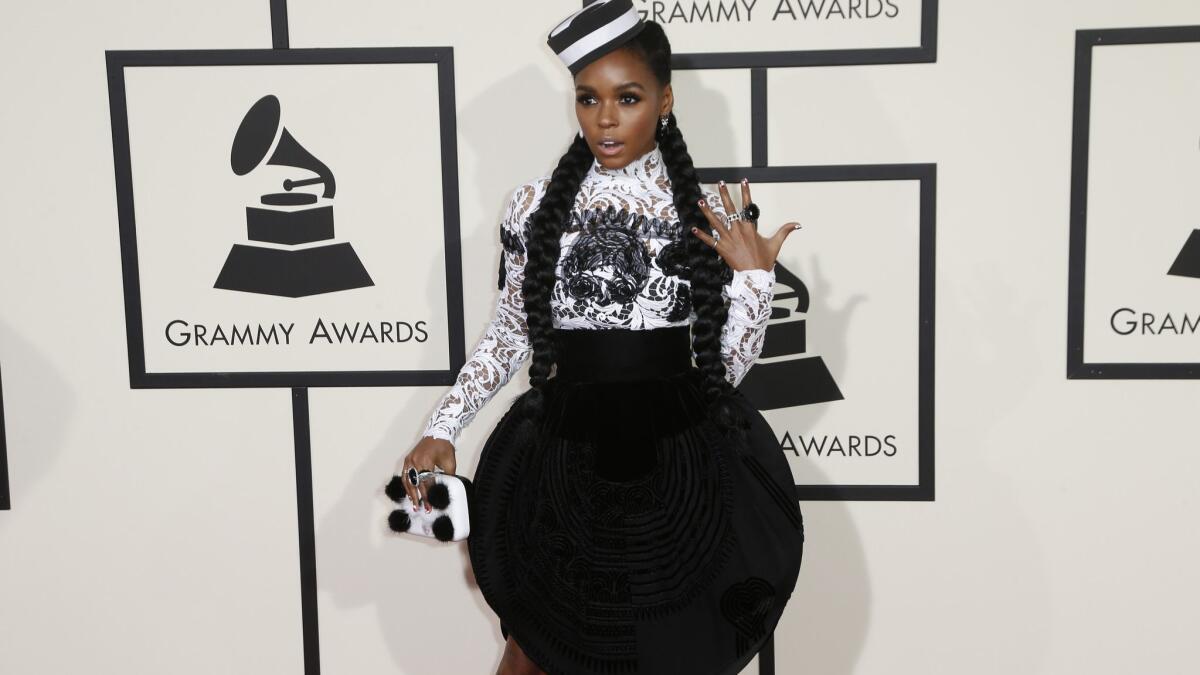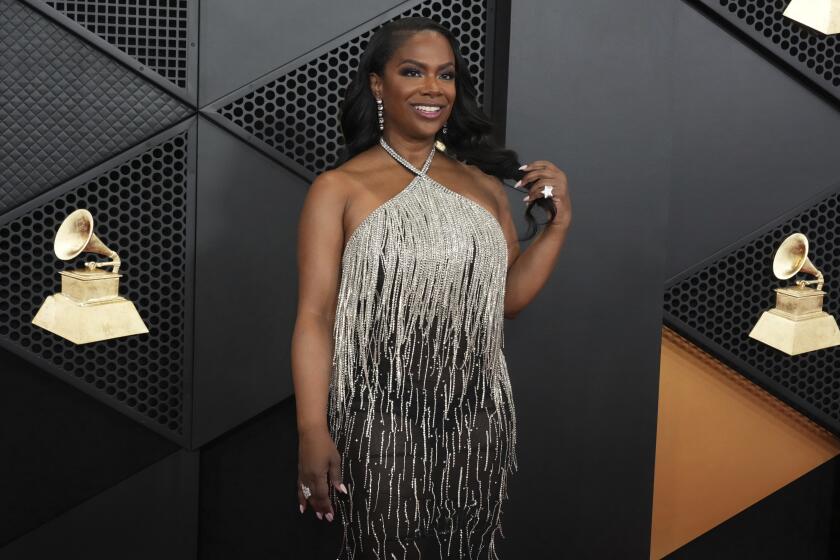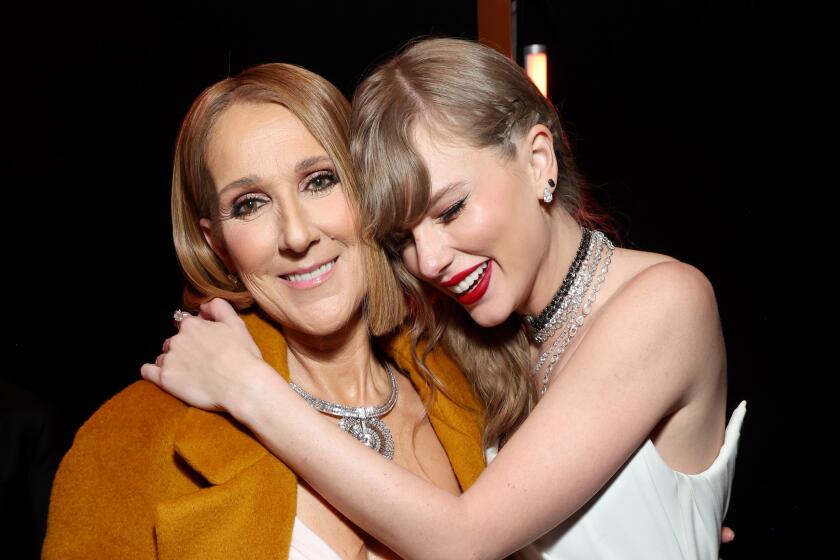Can 2019 Grammy Award nominations avoid last year’s #GrammysSoMale criticisms?

It’s a safe bet that more eyes than usual will be focused on Friday’s announcement of the 2019 Grammy Award nominations.
For the first time in Grammy history, the ceremony is rolling out under the watchful eye of a high-profile diversity and inclusion task force created by the Recording Academy.
January’s 60th awards ceremony won praise for emphasizing hip-hop and R&B in many top fields — the pop-leaning R&B of Bruno Mars won the album of the year — but was almost immediately overshadowed by a #GrammysSoMale backlash. Female artists were largely shut out in the top awards categories, and in an interview after the ceremony, Recording Academy President and CEO Neil Portnow compounded the issue by stating that women should “step up.”
But it doesn’t requirea task force to seethat #GrammysSoMale shouldn’t be an issue for the Feb. 10, 2019, awards. That’s provided, of course, that the Recording Academy’s approximately 13,000 voting members had their pulse on the most important music of 2018.
A look at the most popular and critically acclaimed works of the last few months reveals that the bulk of them were created by female artists such as Taylor Swift, Cardi B., Kacey Musgraves, Janelle Monáe, St. Vincent, Kali Uchis, Ariana Grande and Courtney Barnett, among many, many others.
Of course, if the Grammys get it wrong, it wouldn’t be the first time its members failed to read the pop-culture room.
About this time one year ago, many in the Recording Academy were being praised for the racial and musical diversity evident in 2018’s nominations. But hip-hop and R&B had been the lingua franca of pop music for more than a decade before the Grammys recognized the music in a substantive way in its top categories of album, record, song and new artist.
And can a task force that’s only been in existence since May course-correct a longstanding Grammy conservative streak? For even when voters recognize adventurous work, they tend to default to known quantities, as when Taylor Swift’s “1989” beat Kendrick Lamar’s “To Pimp a Butterfly” for album of the year at the 2016 ceremony. Or when Beck’s pleasantly folky “Morning Phase” took the same prize over Beyoncé’s daring self-titled 2013 set.
The task force, led by Tina Tchen, the ex-chief of staff for former First Lady Michelle Obama, noted that her 18-member group is not looking for specific statistical diversity quotas among the next round of Grammy nominees or winners.
But she stresses that the process that yields awards is now more representative of the world in which they exist, as vast changes have been made to the demographic makeup of the academy’s governance and nomination review committees.
“What we wanted was to make sure there was going to be more diversity in the process, not a set of quotas in the winners,” Tchen told The Times on Wednesday. “We want good decisions to be made. The area we thought was most important to influence was the composition of the committees. I do believe in the research, and all the research shows that diverse teams make better decisions. The results are better when you have a diversity of viewpoints, and different experiences in the room where decisions are made.”
The results are better when you have a diversity of viewpoints, and different experiences in the room where decisions are made
— Tina Tchen
Of course, conquering institutional entertainment industry biases is a more long-term challenge.
“It is sort of crazy,” said actor-musician Zooey Deschanel, half of the indie rock duo She & Him with co-songwriter and producer Matt Ward, better known by his nickname, M. Ward, with whom she has released six albums in the last decade. She’s been nominated for Grammy and Emmy Awards in years past.
“One thing that’s interesting being a female who plays music and writes music is that whenever we have been interviewed, everyone would assume Matt would write the music.
“But I write the music for She & Him,” she said, “and in every interview they would assume I didn’t have anything to do with the writing. I thought it was maybe because I’m an actor, and they assume I would rely on someone else, but when I talk to other musicians who are women, they go through the same thing: Every time you work with a male, people think they are the creative ones.
“I have to believe there’s no malice in it, and I don’t hold it against anybody,” Deschanel said. “But it’s a strange uphill battle.”
Indeed, the issues of diversity and fair representation that Grammy voters are wrestling with reach far beyond the music industry.
“The recording industry, like the broader entertainment industry, is particularly vulnerable to this because a huge part of the workplace and the workforce consist of people who are not employees of anyone: the makeup artists, the roadies on the tour, the guest musicians — they’re not covered by any kind of protections for sexual harassment. That’s something that’s very complicated to look at. How do we address those issues?” Tchen said.
To begin to answer such a question the group identified measures that could be implemented promptly to exert some impact on the 2019 Grammy nominations and awards.
The most immediate change came in June with word that the academy would be expanding its four marquee categories to allow for up to eight nominees in each rather than the traditional five. The task force also recommended changes to the demographic makeup of the academy’s governance and nomination review committees.

RELATED: Grammy nominations are due Friday. Here are three story lines to follow »
The review committee is now 51% female and 48% people of color, up from last year’s numbers of 28% female and 37% people of color. The governance committee ratios are now at 48% female and 38% people of color, over the 2017 breakdown of 20% female and 30% people of color, Tchen confirmed.
“That’s a big jump,” she said, “and I think this demonstrated the commitment and seriousness with which the leadership of the academy is taking our recommendations.”
The task force’s initial steps are being met with cautious optimism.
“Those are super important conversations to have, because I think it’s important to constantly better ourselves and the programs that reward artistic excellence,” said Colombian American singer-songwriter Kali Uchis.
Marion Kraft, country singer-songwriter Miranda Lambert’s manager and a non-voting academy member, said, “The group that was assembled speaks for itself with their backgrounds and expertise, and I am a fan of a lot of the folks on that list. I am hopeful that positive changes are ahead, but also believe that these types of changes take time. I think that the Recording Academy strives to improve the imbalance, and they know that the world is watching.”
Even before the #GrammysSoMale campaign erupted earlier this year, the academy had been trying to contemporize its membership rolls. One way was to switch to an annual qualifying and renewal process from the near-automatic five-year renewal period that had long existed.

RELATED: Dear Grammy voters: Here’s how to get the nominations right »
Additionally, an outreach campaign initiated by the task force sent invitations for Recording Academy membership to 900 unspecified members of the music community, saying it was focusing on women, people of color and those under 39 years old. Tchen said 22% of the invitees, or about 200, accepted those invitations and joined ahead of the Nov. 15 eligibility cutoff that allows them to participate in this year’s voting.
“There’s a longer-term process of looking at issues in the academy,” Tchen said. “What people should understand is that combating sexual discrimination and racial discrimination and creating a better workplace and more diversity is pretty complicated, long-term work. You’re changing norms that are not limited to any single workplace. It extends across our whole culture. … It’s going to take some effort, and I commend the academy for its willingness to act on it.”
Among the task force’s finding on perceived areas where improvement is needed is awareness in the music community of both the existence of the Recording Academy and its mission.
“A lot of artists don’t realize they are eligible to be part of the academy,” Tchen said. “We want to make sure they understand what the academy is about and what the advantages are of membership.”
Country superstar Willie Nelson underscored that point when asked recently whether he is a member of the academy. “I don’t know — am I?” he said. “I’m a member of the Musician’s Union — I know that.”
I don’t know — am I?
— Willie Nelson, when asked if he’s a member of the Recording Academy
Asked if she was a member of the Recording Academy, Uchis paused. “I don’t know. I hope so. Do you have to be [a member] in order to be nominated?”
The Grammy process can be mysterious even to those involved with Grammy-winning acts.
“I know they send out ballots, but I never got one and I never voted,” said Tony Margherita, who is now retired but served as the longtime manager of Wilco, which won an alternative album Grammy for 2004’s “A Ghost Is Born.”
“I think some of the artists voted, but it always seemed murky,” Margherita said. “The Grammy process, and the Grammys themselves, always felt like a completely different business than the business I was operating in. I think the band felt it was nice. The trophy is nice.”
One battle at a time.
“To be clear, it’s not like there are any easy answers,” Tchen said. “If there were easy answers, it would be done.”
Times staff writers Todd Martens, Randall Roberts and Mikael Wood contributed to this report.
Follow @RandyLewis2 on Twitter.com
For Classic Rock coverage, join us on Facebook
More to Read
The biggest entertainment stories
Get our big stories about Hollywood, film, television, music, arts, culture and more right in your inbox as soon as they publish.
You may occasionally receive promotional content from the Los Angeles Times.






